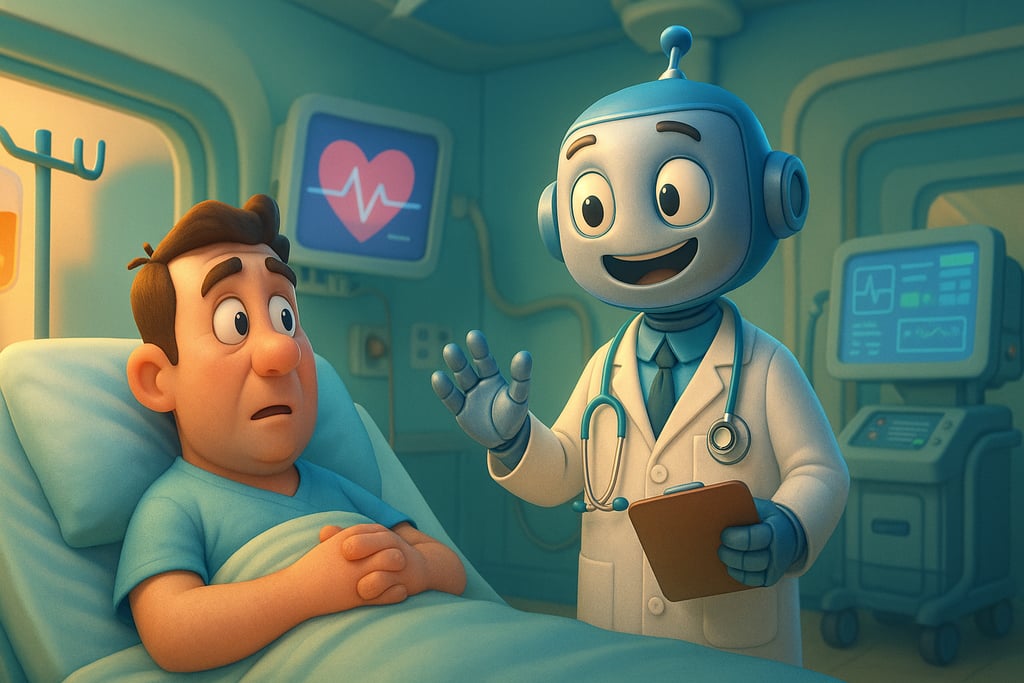China’s AI Hospital Revolution: When Your Doctor Might Be Running on Wi-Fi
HEALTH
MIke
5/19/20253 min read


China’s AI Hospital Revolution: When Your Doctor Might Be Running on Wi-Fi
In what might sound like the setup for a sci-fi comedy (or a very ambitious episode of Black Mirror), China has launched Agent Hospital — the world’s first fully virtual healthcare facility staffed entirely by AI doctors. Yes, you read that right: no waiting room magazines, no awkward small talk — just pure machine medicine.
Developed by the sharp minds at Tsinghua University’s Institute for AI Industry Research (AIR), this digital hospital features 42 AI doctors across 21 departments. These aren’t your average chatbot therapists either. These agents diagnose, treat, prescribe, and follow up — and unlike your local clinic, they never go on vacation or forget your birthday.
From Silicon Valley Dreams to Chinese Clinics
The roots of Agent Hospital can be traced back to early 2024, when Tsinghua University said, “Let’s build a hospital where no one catches a cold — because no one’s human.” Inspired by Stanford’s AI town (where Sims meet spreadsheets), the team decided to crank up to eleven and apply the concept to medicine.
Enter Tairex, the startup baby of AIR, currently tinkering and testing the platform in Wuxi, Jiangsu. Public trials are slated to begin in early 2025 — just in time for your next existential crisis about being replaced by a robot with a stethoscope.
Also, China’s projected AI investment over the next six years is a cool 10 trillion yuan (US$1.4 trillion). That’s enough to fund every vending machine in the country and still have money for AI surgery.
How It Works: The MedAgent-Zero Magic Trick
The backbone of Agent Hospital is MedAgent-Zero — a system where doctor-bots teach themselves. They learn from both successful and oops-that-didn’t-go-well cases. This isn’t just “read the textbook and move on.” It’s machine learning meets medical residency on steroids.
The platform uses models like ChatGPT-3.5 and ChatGPT-4, plus multimodal tech that can juggle X-rays, text, and lab results without breaking a virtual sweat.
These AI agents handle everything: triage, diagnosis, treatment, rehab — the whole medical rollercoaster. Oh, and thanks to time-compression tech, they can simulate years of experience in just days. You know, like binge-watching Grey’s Anatomy on 5x speed, except actually useful.
Performance stats:
88% exam accuracy
95.6% diagnostic accuracy
77.6% treatment accuracy
93.06% on respiratory exams in MedQA (aka AI passed medical school with honors)
And yes — it’s treated over 10,000 patients in days. A human doctor would need two years and a lot more coffee to match that.
Training Tomorrow’s Doctors — Today
Forget practicing on mannequins or nervously poking real patients. Medical students can now train in Agent Hospital, safely bungling diagnoses without harming anyone (except perhaps an AI’s feelings).
Want to learn how to handle a rare tropical disease? Or simulate a chaotic outbreak? There’s an AI patient for that. Tens of thousands.
This isn’t your grandpa’s med school. It’s like Pokémon, but instead of catching ’em all, you’re diagnosing ’em all.
Saving the World, One Algorithm at a Time
The implications? Massive. In rural areas where the only clinic might be a tent and a goat, Agent Hospital could deliver real-time, quality medical help via smartphone. Doctors are expensive. AI runs on electricity and sass.
Even the International Committee of the Red Cross is intrigued. AI triage could be a lifesaver in warzones and crisis areas where hospitals are rubble.
The dream: AI doctors handle the routine stuff, freeing human doctors to focus on complex, touchy-feely things like “empathy” and “explaining insurance paperwork.”
But Hold Up… Is It Ready for Humans?
Right now, Agent Hospital only works with virtual patients. The tech is promising, but transitioning to real-world use means facing the real-world monster: regulations (cue dramatic music).
Also, there are spicy ethical questions:
Who’s responsible if an AI misdiagnoses?
How do you ensure patient data is safe from hackers and nosy neighbors?
And perhaps most importantly: will AI ever learn actually to read a doctor’s handwriting?
Lead researcher Dr. Dong Jiahong wisely reminds us: AI can boost precision, but it can’t give you a reassuring nod or hold your hand through tough news. So no, the robots aren’t replacing your doctor. Yet.
The Fine Print: Rules, Ethics, and Quality Control
Agent Hospital’s success hinges on strict regulatory compliance. Developers are working closely with medical authorities to ensure every AI prescription, diagnosis, and awkward bedside manner is safe and accurate.
Quality checks? Absolutely. Think of it like a robotic peer-review committee that never sleeps. The AI is constantly learning — but human doctors still step in to say, “Hey, maybe don’t prescribe cough syrup for a broken leg.”
Final Diagnosis: A Bold Step Toward the Future
Agent Hospital is a moonshot. A bold, wild, possibly brilliant moonshot. It’s not just a tech demo — it could redefine how we train doctors, access care, and respond to global health challenges.
If it works, China may not just be pioneering the future of healthcare. It may teach the rest of the world how to do it better, faster, and with fewer parking headaches at the doctor’s office.
So next time you feel under the weather, don’t be surprised if your symptoms get checked by someone (or something) who runs on GPU power.
